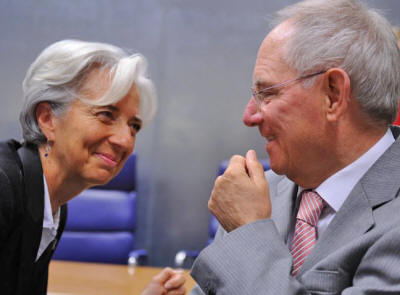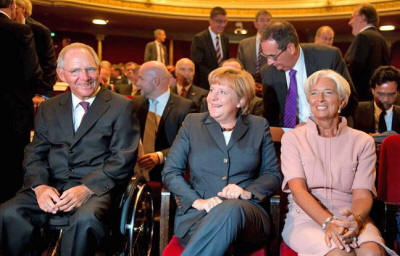
by Jack Ewing
April 17, 2013
from
NYTimes Website
FRANKFURT
When Wolfgang Schäuble, the German finance minister and war horse of
European politics, celebrated his 70th birthday at a theater in
Berlin last September, two of the most powerful women in the world offered
warm words in his honor.

Christine Lagarde,
managing director of the IMF,
is a close friend of Wolfgang
Schäuble, the German finance minister.
One was Chancellor Angela Merkel.
The other, delivering the keynote speech, was Christine Lagarde, the
managing director of
the International Monetary Fund.

Mr. Schäuble celebrated his 70th birthday last September with
Angela Merkel, center, and
Ms. Lagarde at a theater in Berlin.
Ms. Lagarde’s presence reflected her close, longtime friendship with Mr.
Schäuble. But it also was a confirmation of the enormous stature that Ms.
Lagarde and the IMF have acquired in Europe as a result of the euro crisis.
The IMF has more say over crisis management than many Eurozone members, and
Ms. Lagarde has become a quasi head of state, whose views carry more weight
than those of many elected leaders. Indeed, without the IMF’s money and
advice, the Eurozone might have fallen apart by now.
Because she has Mr. Schäuble’s ear and respect, Ms. Lagarde has also played
an important role overcoming German reluctance to accept proposals intended
to strengthen the Eurozone, like a centralized bank supervisor.
Recently, there have been signs that Ms. Lagarde is seeking to nudge Mr.
Schäuble and the German leadership to moderate their views on an issue that
is central to the crisis: the degree of austerity that should be imposed on
countries like Greece and Portugal.
For most of the last three years, the IMF and Germany have insisted that aid
recipients must cut government spending and raise taxes. But lately Ms.
Lagarde has been arguing that too much austerity could be counterproductive.
A shift by the IMF would transform the debate in Europe. But the fact that
the organization is so tangled in European affairs is controversial both
inside and outside the Continent, and could be a source of discord as the
IMF and World Bank hold their spring meetings in Washington.
The policy-making bodies of both organizations
meet on Saturday, while related conferences and other events began on Monday
and continue through Sunday. Poorer nations that contribute to the IMF’s
financing have grumbled about having to prop up rich Europe.
More than half of the IMF’s lending goes to the
Eurozone, from virtually nothing a few years ago.
The IMF has contributed about a third of the
money used to rescue countries like Portugal, Ireland and Greece, with the
rest coming from other Eurozone countries.
“Historically, Europe took no IMF lending,”
said Guntram B. Wolff, the deputy director of Bruegel, a research
organization in Brussels. “Now lending has increased since the beginning
of the crisis dramatically. Is it appropriate? That is a very big
question.”
Leaders and citizens of countries like Greece,
Portugal and Ireland have complained bitterly about the terms that the IMF,
as part of
the so-called troika of technocrats along
with the European Central Bank and the European Commission, has imposed in
return for loans.
In addition to budget cuts and tax increases, governments have been
pressured to roll back rules that protect some workers from dismissal and
impose other unpopular changes. Even if the IMF is rethinking its stance on
austerity, it will continue to demand strict conditions because that is the
only leverage the organization has to get its money back.
Ms. Lagarde, the former finance minister of France, is perceived as less
doctrinaire than the Germans, but she was at the table last month when
leaders negotiated an ill-fated plan to make ordinary bank depositors help
pay for a bailout in Cyprus.
Although the IMF had reservations about imposing
a levy on insured depositors in Cyprus, Ms. Lagarde went along with the
accord. After an outcry, the plan was revised to put the burden on large
depositors.
But even those who have doubts about the IMF’s role in Europe see no
alternative.
The organization will inevitably be a force in
Europe for years to come, because of the money that it has lent and because
of its traditional role as watchdog over the economic and budget policies of
its members.
“If the IMF wasn’t participating at all, the
crisis would have been worse,” said Morris Goldstein, a former deputy
director of research at the IMF who is now a senior fellow at the
Peterson Institute for International Economics, a research organization
in Washington.
Besides the money the IMF has provided, which
comes from members including the United States and Japan as well as those in
Europe, the organization has played the role of outside expert, aloof from
national politics.
In the absence of a strong federal government in
Europe, Ms. Lagarde helps impose order on quarreling national leaders.
The IMF also helps lend legitimacy to decisions by political leaders. It is
unlikely that the German Parliament would have approved the country’s
contributions to Eurozone bailouts if the rescue plans had not had the IMF’s
stamp of approval.
“If Europe was organized as a federal state
we wouldn’t need an IMF,” Mr. Wolff of Bruegel said. “There isn’t enough
trust in Europe. They prefer to have an outside player.”
Despite Ms. Lagarde’s relationship with Mr.
Schäuble, which seems to be genuinely warm, she has often demonstrated her
independence.
She has warned numerous times that European
banks have not confronted their problem loans aggressively enough. She has
prodded leaders to move more quickly to establish a central bank supervisor
with more powers, and to establish a system to wind down failed banks
without burdening taxpayers.
Such advice is not necessarily welcome in Germany, whose banks have their
own share of troubles. German leaders have moved more slowly on centralized
bank regulation than some other leaders would like.
Still, the IMF and the Germans agree more often than they disagree.
“Germany has the largest economy and the one
in the best condition,” Mr. Goldstein of the Peterson Institute said.
“If this is going to work, you need to get along with the Germans.”
The IMF’s power is not absolute.
When the IMF lends to troubled developing
countries, its traditional function, it is typically the largest creditor
with a dominant role in decision making. In Europe, the IMF is a minority
creditor, with less financial clout than the European Union.
That is awkward, some IMF watchers say.
“They have to make compromises, more
compromises than they would like to make,” Mr. Goldstein said. “I think
that’s a problem.”
But for all the grumbling, the IMF has little
choice but to remain deeply involved in European affairs.


